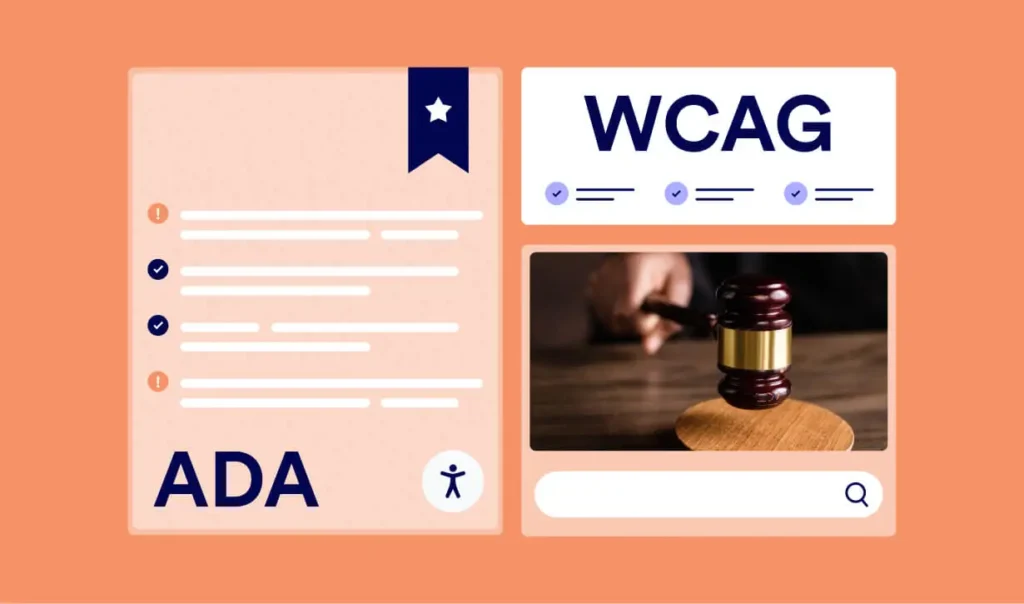Tech Fusion House: ADA Compliance and Information
Ensuring your website is accessible isn’t just about moral obligation—it’s also a strategic move that can enhance traffic and potentially qualify you for tax credits. Moreover, it’s a legal requirement under the Americans with Disabilities Act (ADA). With a surge in lawsuits related to web accessibility, understanding ADA regulations and compliance standards is crucial to avoid legal entanglements and maintain a positive reputation.
In this article, we delve into the intricacies of web accessibility regulations and standards, including the Americans with Disabilities Act (ADA) and the Web Content Accessibility Guidelines (WCAG). Additionally, we’ll explore pertinent laws and trends in litigation.
Overview of ADA and WCAG – What They Encompass
ADA
Enacted in 1990, the Americans with Disabilities Act (ADA) provides comprehensive civil rights protections to individuals with disabilities in various spheres, including employment, government services, public accommodations, transportation, and telecommunications. With the increasing importance of online interactions, the ADA now encompasses web accessibility.
Since 2018, ADA principles have extended to web accessibility, recognizing the significance of ensuring websites, internet portals, and online stores are accessible to individuals with disabilities.
In 2022, the Department of Justice (DOJ) reaffirmed its stance from 2018, affirming that websites are considered places of public accommodation and must adhere to the ADA’s requirements for non-discrimination and effective communication. For additional information on the ADA, visit [link to your preferred resource].
WCAG
The Web Content Accessibility Guidelines (WCAG) serve as a comprehensive guidebook, outlining how websites should be designed and function to ensure usability for people with disabilities. While not explicitly referenced in the ADA, WCAG has become the standard for achieving ADA compliance.
Adhering to WCAG guidelines ensures your website meets accessibility standards and facilitates inclusivity. To learn more about WCAG, refer to [link to your preferred resource].
Other Legislation Pertaining to Web Accessibility
Apart from the ADA, various countries have additional accessibility laws that may apply to specific clients based on their business operations.
Key legislations include:
Section 508: Part of the Rehabilitation Act of 1973, Section 508 sets guidelines for government entities and organizations receiving federal funding, mandating accessible information and communications technology (ICT).
Accessibility for Ontarians with Disabilities Act (AODA): Enacted in 2005, AODA establishes accessibility standards for organizations in Ontario, Canada, with a workforce of at least 20 employees.
UNRUH – The Unruh Civil Rights Act: This California Civil Code Section 51 prohibits discrimination by businesses in California, safeguarding against various forms of discrimination.
New York City Human Rights Law (NYHRA): New York has enacted anti-discrimination legislation at both state and city levels, protecting individuals with disabilities from discrimination.
Lawsuit Trends – ADA-Related Lawsuits: Numbers and Patterns
In recent years, there has been a significant uptick in demand letters and lawsuits concerning web accessibility. It’s estimated that hundreds of thousands of businesses have received these letters, with a small percentage escalating to trial. In 2023 alone, there were 4,605 ADA web accessibility lawsuits filed, indicating a notable increase.
With the proliferation of legal actions, it’s imperative to comprehend the trend and its potential ramifications for your business. Ensuring your websites are accessible and compliant with ADA standards is paramount.
Here are some pertinent statistics and figures:
2023 witnessed a record-breaking number of ADA lawsuits and demand letters.
In 2023, 4,605 lawsuits were filed, constituting only 3% of demand letters, implying that the majority are resolved before trial.
Over 100,000 business owners received demand letters in 2023 for having inaccessible websites.
Since 2019, there has been an average annual increase of 13% in lawsuits related to web accessibility.
ADA violations can incur fines of up to $150,000, with the average settlement for ADA website lawsuits ranging from $20,000 to $50,000.
The graph below illustrates the trend in demand letters related to web accessibility, accompanied by the year-on-year growth percentage:
[Insert Graph Here]
Tech Fusion House is committed to assisting businesses in navigating ADA compliance and ensuring their online platforms are accessible to all users. Our comprehensive services encompass ADA audits, website remediation, and ongoing support to mitigate legal risks and foster inclusivity. Stay ahead of the curve with Tech Fusion House and safeguard your business from potential legal entanglements while enhancing user experience for all.



